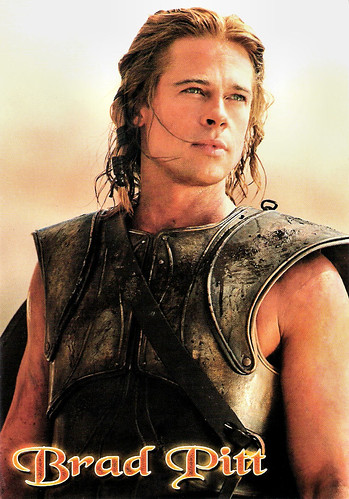
Italian postcard by EdiBas S.r.l., Torino, no. Pc 1.338. Photo: Grazia Neri. Brad Pitt in Troy (Wolfgang Petersen, 2004).

British postcard. Photo: Warner Bros. Diane Kruger as Helen of Troy in Troy (Wolfgang Petersen, 2004).

British postcard in the Cinemascope Collections, no. 617. Orlando Bloom in Troy (Wolfgang Petersen, 2004).
The decade-long Trojan War condensed in a few weeks
The script for Troy (Wolfgang Petersen, 2004) was written by David Benioff. It is loosely based on Homer's 'Iliad' in its narration of the entire story of the decade-long Trojan War — condensed into little more than a couple of weeks.
In the year 1193 BC, Agamemnon, king of Mycenae (Brian Cox), dominates most of the Greek world. Then, during a peace mission, the Trojan prince Paris (Orlando Bloom) lures Helena (Diane Kruger), the most beautiful woman in Greece, away from her husband, King Menelaus (Brendan Gleeson) of Sparta.
Menelaus is compromised in his honour and convinces his brother Agamemnon to take part in an attack on Troy. Agamemnon sees in the attack his chance to expand his power even further. Backed by thousands of Greek kings and warriors, they set off with 1,000 ships holding 50,000 Greeks to Troy.
The warriors include Ajax (Tyler Mane), Odysseus (Sean Bean) and Achilles (Brad Pitt) with his Myrmidons. For a long time, the battle between the Greeks and Trojans dragged on, with many deaths on both sides. It is only with the construction of the Trojan Horse that an end is forced to the bloody war.
The film's total production costs came to $175,000,000, making Troy one of the most expensive films ever if not adjusted for inflation. Worldwide, the film brought in a total of $497,409,852. Troy was received with mixed reactions by viewers and critics. Roger Ebert gave the film 2 stars, expressing disappointment in the film since it deviates so much from the original mythology.
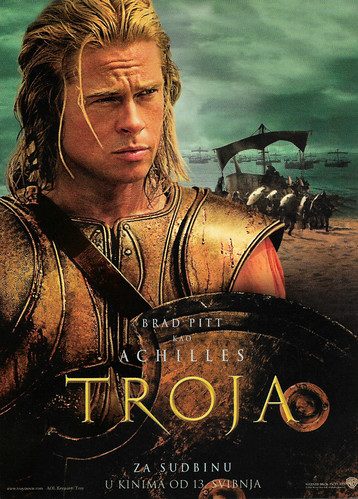
Serbian promotion card. Photo: Warner Bros. Brad Pitt as Achilles in Troy (Wolfgang Petersen, 2004).
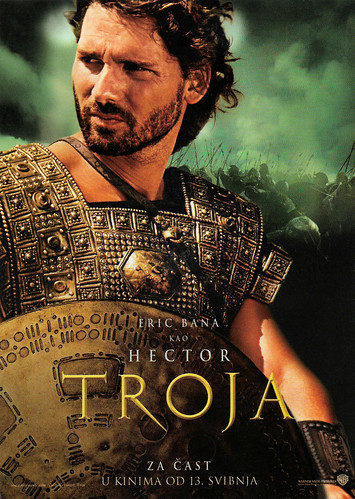
Serbian promotion card. Photo: Warner Bros. Eric Bana as Hector in Troy (Wolfgang Petersen, 2004).
The role of the gods is greatly reduced
The large sets for Troy were built at Fort Ricasoli in Malta. Shooting took place here from April to June 2003. Other major filming locations were Mellieħa and Comino. Scenes at the outer walls of Troy were shot in Cabo San Lucas.
To keep the story of Troy from becoming too complex, the film narrative deviates from Homer's works on the Trojan War in certain ways. First, in the film, the Trojan War lasts much shorter than Homer's: a few weeks instead of ten years. In addition, some important characters, including Diomedes, Calchas, Laocoön, Palamedes and Cassandra, are missing from the film. Furthermore, certain characters meet their end differently in the film than in Homer's stories.
The role of the gods is also greatly reduced in the film. In Homer's works, especially Zeus, Hera, Pallas Athene, Ares and Apollo take an active part in the war, unlike in the film. In the film, Agamemnon is the commander of all the Greek armies and was convinced by his brother to go to war. In Homer's works, almost all the kings of Greece were suitors of Helen of Sparta. When she chose her husband, Odysseus made all these men take an oath to protect her chosen marriage. When Helena was taken away from Menelaus, he made all the former suitors honour their oaths by travelling with him to Troy.
Since Agamemnon had the largest army, he was the commander-in-chief. In the film, the duel between Paris and Menelaus is not decisive, or in other words, the outcome of the battle did not mean the decision of the war. In the 'Iliad', the duel takes place in the tenth year of the war, when everyone is longing for the end. The duel was to bring the decision. Paris lost the duel to Menelaus, but was saved just in time by the goddess Aphrodite and thus managed to escape death. Apollo, however, had a Trojan throw a spear at the Greeks, breaking the treaty and allowing the war to resume in full force. In the film, Menelaus also wins the duel, but Hektor intervenes to protect his brother, killing Menelaus in the process.
Roger Ebert gave a thumbs up in his review but also wrote: "By treating Achilles and the other characters as if they were human, instead of the larger-than-life creations of Greek myth, director Wolfgang Petersen miscalculates. What happens in Greek myth cannot happen between psychologically plausible characters. That's the whole point of myth."

Serbian promotion card. Photo: Warner Bros. Orlando Bloom as Paris in Troy (Wolfgang Petersen, 2004).
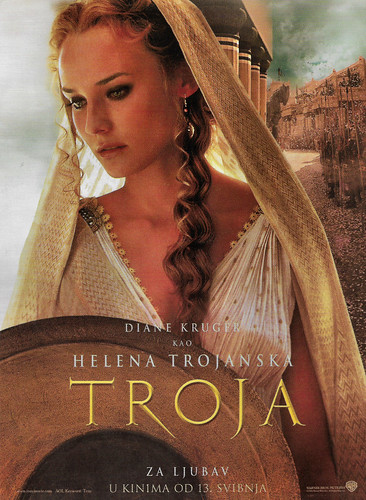
Serbian promotion card. Photo: Warner Bros. Diane Kruger as Helen of Troy in Troy (Wolfgang Petersen, 2004).
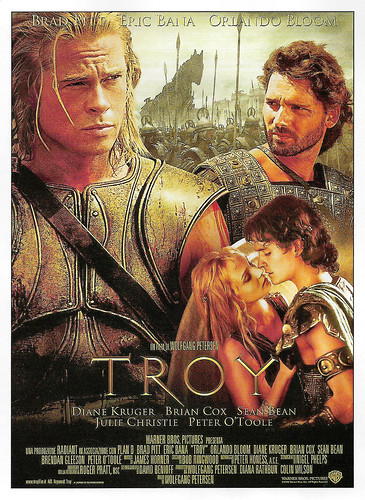
French collectors card. French film poster by Warner Bros. Brad Pitt, Diane Kruger, Orlando Bloom and Eric Bana in Troy (Wolfgang Petersen, 2004).
Sources: Roger Ebert (Roger Ebert.com), Wikipedia (Dutch) and IMDb.
No comments:
Post a Comment